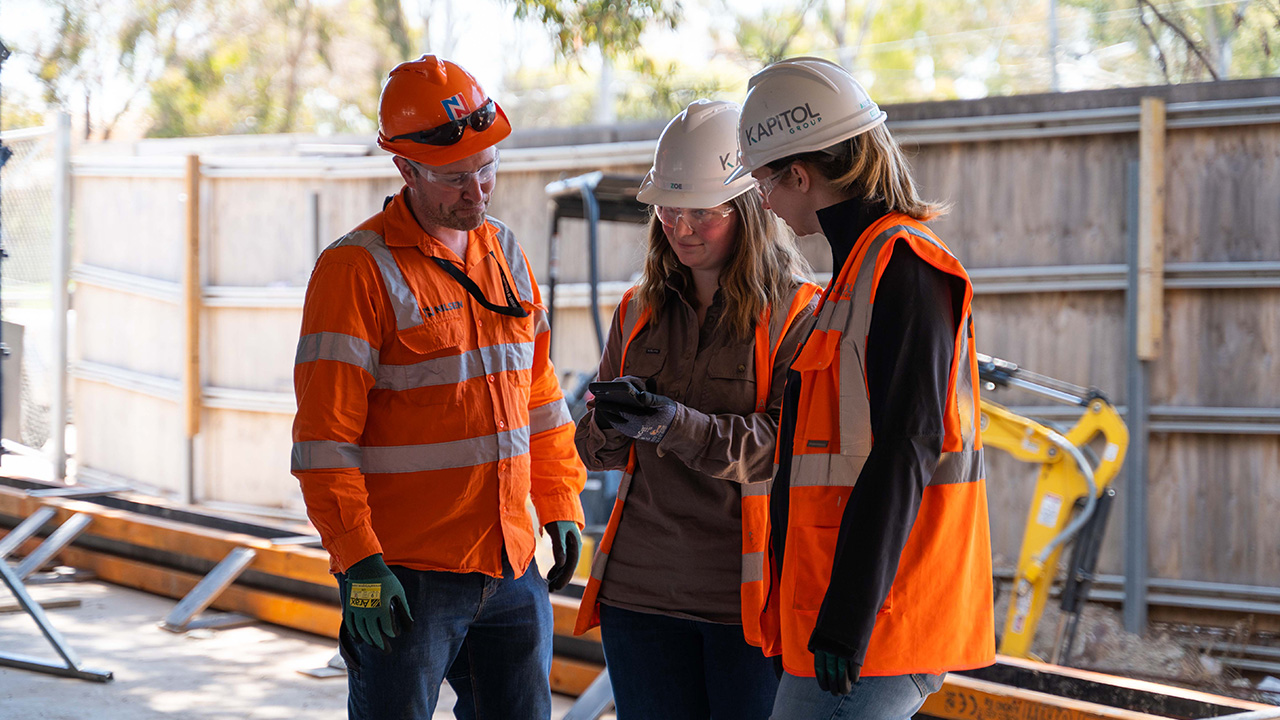
Share this story
The future is female. And while several state governments have identified females as the key to addressing the multi-billion-dollar skill shortages in construction, young women are giving the industry the cold shoulder.
And why wouldn't they? I can only speak to the past twenty years, but very little has changed in this time with respect to construction’s reputation of poor mental health and inflexible working conditions. These toxic traits are costing the sector $8 billion each year, according to research commissioned by the NSW and Victoria state governments. They also create significant barriers for women, who still carry the bulk of the burden of family planning.
The construction sector is not unique in facing skills shortages; however, it is one of the sectors that seemingly repels viable candidates based on its bad reputation. Case in point: the National Association of Women in Construction (NAWIC) 's surveyed 575,000 women, and more than half cited negative workplace culture as the biggest challenge in the industry. Most alarmingly, 41 per cent of respondents had left a role or the industry overall due to the poor behaviour of male colleagues.
Government quotas and education programs are a good starting point for addressing both staff shortages and the underrepresentation of women in trades and construction. But, in some ways, these raise more questions than they answer. For example, the Victorian government has mandated that 45 per cent of the workforce on government projects must be female by the beginning of 2024. Yet, with just over a year to go, women still only represent 13 per cent of the industry. Further, the overall decline in people completing trades and the fact that less than one per cent of school leavers have considered a career in construction means the talent pipeline is actually going backwards.
For a long-term solution, the industry as a whole – not just the major players – needs to supplement government initiatives with programs that remedy both poor workplace culture and negative attitudes towards women and renovate the industry's reputation.
Kapitol Group partnered with not-for-profit Empowered Women in Trade (EWIT) as they provide a prime example of grassroots action that can steer the industry where it needs to go. Founded by Charted Practicing Accountant (CPA)-turned-welder, Hacia Atherton, EWIT provides women aged between 18 and 50 access to skills and psychology workshops, networking events, and first-hand experience of what it's like to work onsite.
Hacia was warned off the sector by male relatives, who, by their own admission, lamented the poor conditions unfit for someone they cared about. However, Hacia found that the industry, at times, was more accepting than her well-meaning relatives made out and was compelled to show other women how good having a trade could – and should – be.
Central to Kapitol Group's partnership with EWIT is working with Victorian schools to educate females on opportunities as tradespeople and in the construction industry. Remuneration growth potential, flexible working options, as well as demystifying some of the preconceived ideas of the industry are discussed with students to place the industry on their career radar.
As students in years 9 and 10 consider the subjects that will be the basis of their tertiary studies, you'd think this would add to the pipeline of prospective talent. Yet, according to research by the University of New South Wales, even teenage girls perceive the sector as intimidating and disrespectful to women. Students also don't deem the industry a "prestigious" enough career, which partly echoed their parents' attitudes. While the study found that parents generally supported independent career decisions, many did not consider construction a viable career path.
Ask yourself, would you like your daughter to enter an industry where she will be paid an annual six-figure salary and have a secure career for life? Sounds like the dream. But what if it came at the cost of toxic culture, harassment, intimidation, and gatekeeping? With all that in mind, a CPA sounds like the far better option.
All corners of our industry must contribute to shifting the attitudes of industry professionals, potential recruits, and the wider community. With the Australian Construction Industry Forum expecting accelerated growth in building and construction over the next 12 months, we need to make swift and tangible changes to suit the talent we desperately need to attract.
And while we're pessimistic that the quota of 45 per cent female representation will be met by 2024, we know there are ample intelligent and motivated individuals in trades and construction who can and will be the drivers of positive change. Some of them are even men.
And why wouldn't they? I can only speak to the past twenty years, but very little has changed in this time with respect to construction’s reputation of poor mental health and inflexible working conditions. These toxic traits are costing the sector $8 billion each year, according to research commissioned by the NSW and Victoria state governments. They also create significant barriers for women, who still carry the bulk of the burden of family planning.
The construction sector is not unique in facing skills shortages; however, it is one of the sectors that seemingly repels viable candidates based on its bad reputation. Case in point: the National Association of Women in Construction (NAWIC) 's surveyed 575,000 women, and more than half cited negative workplace culture as the biggest challenge in the industry. Most alarmingly, 41 per cent of respondents had left a role or the industry overall due to the poor behaviour of male colleagues.
Government quotas and education programs are a good starting point for addressing both staff shortages and the underrepresentation of women in trades and construction. But, in some ways, these raise more questions than they answer. For example, the Victorian government has mandated that 45 per cent of the workforce on government projects must be female by the beginning of 2024. Yet, with just over a year to go, women still only represent 13 per cent of the industry. Further, the overall decline in people completing trades and the fact that less than one per cent of school leavers have considered a career in construction means the talent pipeline is actually going backwards.
For a long-term solution, the industry as a whole – not just the major players – needs to supplement government initiatives with programs that remedy both poor workplace culture and negative attitudes towards women and renovate the industry's reputation.
Kapitol Group partnered with not-for-profit Empowered Women in Trade (EWIT) as they provide a prime example of grassroots action that can steer the industry where it needs to go. Founded by Charted Practicing Accountant (CPA)-turned-welder, Hacia Atherton, EWIT provides women aged between 18 and 50 access to skills and psychology workshops, networking events, and first-hand experience of what it's like to work onsite.
Hacia was warned off the sector by male relatives, who, by their own admission, lamented the poor conditions unfit for someone they cared about. However, Hacia found that the industry, at times, was more accepting than her well-meaning relatives made out and was compelled to show other women how good having a trade could – and should – be.
Central to Kapitol Group's partnership with EWIT is working with Victorian schools to educate females on opportunities as tradespeople and in the construction industry. Remuneration growth potential, flexible working options, as well as demystifying some of the preconceived ideas of the industry are discussed with students to place the industry on their career radar.
As students in years 9 and 10 consider the subjects that will be the basis of their tertiary studies, you'd think this would add to the pipeline of prospective talent. Yet, according to research by the University of New South Wales, even teenage girls perceive the sector as intimidating and disrespectful to women. Students also don't deem the industry a "prestigious" enough career, which partly echoed their parents' attitudes. While the study found that parents generally supported independent career decisions, many did not consider construction a viable career path.
Ask yourself, would you like your daughter to enter an industry where she will be paid an annual six-figure salary and have a secure career for life? Sounds like the dream. But what if it came at the cost of toxic culture, harassment, intimidation, and gatekeeping? With all that in mind, a CPA sounds like the far better option.
All corners of our industry must contribute to shifting the attitudes of industry professionals, potential recruits, and the wider community. With the Australian Construction Industry Forum expecting accelerated growth in building and construction over the next 12 months, we need to make swift and tangible changes to suit the talent we desperately need to attract.
And while we're pessimistic that the quota of 45 per cent female representation will be met by 2024, we know there are ample intelligent and motivated individuals in trades and construction who can and will be the drivers of positive change. Some of them are even men.
Latest News

Reducing Construction Risk with VDC
Discover how VDC transforms construction—reducing risk, cutting rework, and saving time. Insights from Kapitol, Neoscape & Architectus

Introducing Kapitol’s Five-Part Series About Productivity in Construction
At Kapitol, productivity is a key issue that informs our work, culture, and commitment to innovation.

Laser Scanning - Building with Precision
Harnessing the power of cutting-edge laser-scanning technology, a game-changer for efficiency and accuracy in the construction industry.
